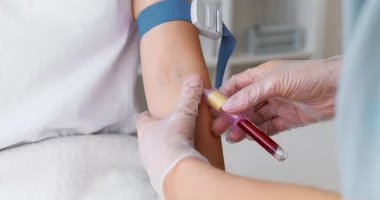Babesia microti is a very small parasite found in certain ticks. When these ticks bite people, they can spread the parasite, leading to an infection called babesiosis.
If you get bitten by a tick carrying Babesia microti, you might get sick with babesiosis. The symptoms can vary a lot, like feeling like you have the flu or getting really sick with bleeding or problems in your organs.
Causes
Babesia infections usually stem from one of three main causes:
Tick Bite
The most normal way to contract a Babesia infection is through a tick bite. Blacklegged ticks, also called as deer ticks, are the primary carriers of B.microti parasites. These ticks are very small, roughly the dimension of a poppy seed, and are commonly found in the Midwestern and Northeastern United States.
Transmission from Blood Donor
In rare cases, a person might acquire a Babesia infection from a donor who appeared no symptoms at the time of donation. In 2018 as per the survey the Food and Drug Administration accredited a test to identify B. microti antibodies in donated blood, potentially enhancing the safety of the United States blood supply.
Transmission from Mother to baby in the stomach
Although very uncommon, a woman can pass a Babesia infection to her baby while pregnant or in childbirth.
Symptoms
A person might start showing signs of a Babesia infection several weeks after being exposed to the parasite, but sometimes it can take several months for symptoms to appear.
For some people, the symptoms might be in the light to medium range. These can include body aches, fatigue, chills, weakness, and fever.
Others might experience a condition called hemolytic anemia, where the body can’t make red blood cells as rapid as it’s destroying them. This can lead to symptoms like liver enlargement, jaundice, severe intolerance to activity, difficulty breathing, and spleen enlargement.
In severe cases, Babesia infections can be dangerous. These cases might involve complications such as disseminated intravascular coagulation, a severe blood clotting disease, heart attack, difficulty maintaining blood pressure, kidney and failure, or respiratory distress.
Some people are more likely to develop severe infections than other people, including those without a spleen, older adults, people with underlying conditions like kidney or liver disease, and anyone with a weakened immune system.
If someone experiences serious symptoms, they should seek immediate medical treatment.
Diagnosis
Finding out if someone has a Babesia infection can be really tricky because the symptoms can look like those of many other sicknesses. Plus, not many people get sick with it – only about 1,000 to 2,000 new cases are reported every year in the U.S.
Doctors might think about babesiosis as a possible cause of sickness when they’ve ruled out other reasons for someone feeling unwell.
If someone has done things that put them at risk, like being outside in places where ticks with the parasite live, or if they’ve had a blood transfusion, a healthcare provider might want to test their blood.
But here’s the catch: most regular labs can’t test for the Babesia parasite. So, the doctor might need to send the blood sample to a special lab, like the Centers for Disease Control and Prevention (CDC).
Treatment
Not everyone who gets a Babesia infection needs treatment. Some people might not even feel sick at all, and if that’s the case, doctors usually won’t give any treatment.
But if someone does feel sick, or if they don’t have symptoms but could get very sick because of other health problems, then the doctor might suggest treatment.
Doctors typically give one of two combinations of medicines:
- Clindamycin with quinine
- Atovaquone with azithromycin
These medicines are taken for 7 to 10 days.
Along with these medicines, the doctor might also give other treatments to help the person feel better. These could include things like:
- Blood transfusions
- Medicine to bring down fever
- Dialysis to clean the blood
- Drugs to raise blood pressure if it’s low
If someone is very sick, they might even need a machine to help them breathe.
When to See a Doctor
If someone has symptoms that might indicate a Babesia infection, such as fever, fatigue, chills, body aches, or weakness, they should see a doctor right away. This is especially important if they know they’ve been bitten by a tick or have spent time outdoors in areas where ticks are common. Prompt medical attention is crucial for proper diagnosis and treatment, which can help prevent the infection from becoming more severe.
Prevention
Preventing tick bites is key to avoiding Babesia infections. There are several steps you can take to protect yourself when spending time outdoors:
First, stick to cleared trails when hiking or walking. This helps you avoid areas where ticks are commonly found, such as brush, tall grasses, and leaf piles.
Second, wear protective clothing. Long socks pants, and long-sleeved shirts that are tucked in can reduce the chances of a tick biting your skin.
Third, choose light-colored clothing. This makes it easier to spot and remove ticks before they can attach to your body.
Additionally, use tick repellents on your skin and clothing. Products containing DEET or permethrin can be effective, but be mindful that some repellents are not suitable for children.
It’s important to know that a tick usually needs to be attached to your body for 36 to 48 hours before it can spread the Babesia parasite. Therefore, after spending time outdoors, make sure to check your body frequently for ticks and remove any you find as soon as possible.
Outlook
The outlook for babesiosis varies depending on several factors, including the person’s overall health, the timeliness of diagnosis, and the appropriateness of treatment. Most healthy individuals who receive prompt treatment with appropriate medications recover fully without long-term complications. However, for older adults, those with weakened immune systems, or individuals with underlying health conditions, babesiosis can be more severe and potentially life-threatening.
Advances in diagnostic testing and increased awareness of prevention strategies, such as avoiding tick habitats and using tick repellents, are improving the management and outcomes of babesiosis. Ongoing research and public health measures continue to enhance the ability to detect, treat, and prevent this infection.
Summary
Babesia microti is a tiny parasite carried by ticks, causing the infection babesiosis. It can be contracted through tick bites, blood transfusions, or rarely from mother to fetus. Symptoms range from mild flu-like signs to severe conditions like organ failure.
Diagnosis is challenging and often involves specialized lab tests. Treatment varies, with medications like atovaquone and azithromycin prescribed, along with supportive therapies for severe cases. Prevention includes avoiding tick habitats, wearing protective clothing, using tick repellents, and performing frequent tick checks.








